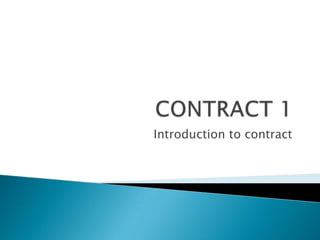Contract 1 (a)
- 2. May be legally binding agreement Creates enforceable rights and obligation Remedy: damages for breach or and specific performance
- 3. ï― Simple Contracts may be made orally/in writing/implied by conduct also referred to as Special Contracts consensus ad idem : (Smith v : Land , Hughes â does not matter what a Conveyance â persons intention is, if he acts a must be in writing certain way as if he is assenting that causes a reasonable person to believe that he has entered in a contract then the party with the Bilateral Contracts: conduct is bound) exchange of promises is sufficient to be enforceable Unilateral Contract: This is where a reward is promised by one person to anyone who finds a wallet, only one person is bound to do something
- 4. Objective test : what the parties did and gleaning through the documents Objective test may be (Gibson v Manchester employed (Centrovincial _Lord Denning indicated Estates PLC v Merchant that we should glen investment(1) through the documents and pay attention to the conduct of the parties) Agreements formed , by Conduct may conduct or when offer determine(Sm is communicated in a ith v Hughes) mutually agreed Agreement manner ??
- 5. Offer Elements of Intention to create legal acceptance relation contract Exclusion Terms clauses Consideration Certainty Privity
Editor's Notes
- 1) Centrovincial estates v Merchant Inv â Claimants rented house yearly for abt 69, 000 pounds subject to review by December, 1982. June 1982 the def sent an offer to the def for 65,000 pounds inviting them to agree that this is the rent at the current market value. Def accepted...later claimants realized upon acceptance that the wrong amount had been quoted. Claimant attempt to recoover and failed as there was no evidence of previous documentation that indicated that the defendants knew of or had to ought reasonable know that the intent, secondly they tried using estoppel , however court held that the mutual promise would suffice.





